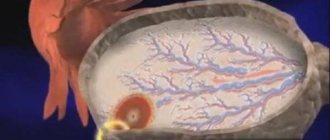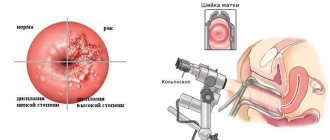Characteristic sensations
Pain after ovulation can be described in different ways.
This largely depends on the individual sensitivity of the body. It can be dull, pulling, stabbing, cutting. Attention should be paid to the intensity. If the pain is so severe that you can't tolerate it or function normally without pain medications, it's a cause for concern.
What gynecologists say about such pain
Pain during ovulation for the most part is not a pathology. All over the world, gynecologists consider such sensations to be an absolutely physiological process. Painful phenomena are typical primarily for young girls (up to 20 years), but can also occur at a more mature age.
As for the duration of pain after ovulation, it is considered normal to experience discomfort for a maximum of 24 hours. This phenomenon does not require any special treatment, for the most part does not cause significant inconvenience to the woman and goes away on its own within the specified time.
Why does my stomach feel tight after ovulation?
Pain is one of the symptoms of ovulatory syndrome. The stomach can pull, why does this happen?
Every month, a follicle is formed in the ovary - right or left. This is a small sac in which the egg is formed. After its maturation, which lasts on average about 14 days, the follicle ruptures to release the egg into the uterus for further fertilization. The rupture process itself does not always remain invisible to the body. In addition to pain, it can be accompanied by nausea, dizziness, bowel dysfunction and general weakness of the body.
IMPORTANT! There is no clear medical description of ovulatory syndrome; it is confirmed by a doctor only by excluding other diseases with similar symptoms.
Rupture of the follicle can also affect the discharge. They become transparent, watery and abundant, creating a favorable environment for the advancement of sperm. Some develop a bloody or brownish tint, but return to normal after 1-2 days.
If you check your calendar and pain occurs later than the day of ovulation, or vice versa, earlier, there can be many reasons.
It happens that discomfort occurs after a few days. Stomach hurts after ovulation, like during menstruation. What could be the reason?
Causes
The most common among them:
Unstable cycle before menstruation
An unstable cycle is not something special for teenagers. In the first year after the start of menstruation, the cycle is just establishing itself, and various ailments are a completely common occurrence. The same applies to women who have given birth. The body is recovering after childbirth, the reproductive organs, which previously worked for 9 months for the development of the fetus, are forced to rebuild in order to once again prepare the egg for fertilization. In this case, cycle instability is also typical for the first year after childbirth.
Disturbance in hormone production
Due to a decrease in the female sex hormone estrogen, a slight detachment of the inner mucous membrane of the uterus may occur. Unpleasant sensations are accompanied by bloody discharge, but do not last long. Hormonal imbalance can be caused by poor diet, recent abortion, diseases of the nervous system and stress.
Stress
This option is worth considering if you do not notice periodicity in your pain at all.
It is difficult to trace the relationship between such discomfort and stress. But it’s no longer a secret that nervous tension directly affects well-being, and can even affect the functioning of a certain organ.
Resistance to stress varies from person to person, making this the most difficult cause to identify. There are cases where, during prolonged experiences, pain turned into illness. In this case, you need to identify the cause of stress and eliminate it.
Infectious diseases
The pain should not cause you much concern if it lasts no more than four days. Otherwise, be sure to visit a specialist, because discomfort may be a symptom of infectious diseases such as:
- Trichomoniasis.
- Gonorrhea.
- Chlamydia.
Cyst
A cyst forms when a follicle ruptures. Then the fluid is distributed along the walls of the ovary, stretching them, which causes pain. This formation is not a tumor, although sometimes it causes an increase in size. Although it causes a tugging sensation in the lower abdomen and sometimes bloating, such a cyst is not cancerous and usually goes away on its own.
The cause of the cyst may be increased blood circulation in the ovary, which occurs as a result of ovulation, pregnancy, childbirth, breastfeeding, and even in the absence of orgasm with strong arousal.
Pregnancy
Does your stomach ache after ovulation, even on days 5-6? This may indicate the beginning of pregnancy. It occurs for two reasons:
- The fertilized egg descends into the uterus.
- The egg attaches to the wall of the uterus.
But pain in this case is not the primary symptom. It is worth waiting for the delay and taking a pregnancy test.
Premenstrual syndrome
A new egg begins to mature in the ovary as soon as the old one dies, which happens approximately 2-3 days after ovulation. In addition to discomfort in the lower abdomen, a woman may experience the following symptoms:
- Heaviness in the lower back.
- Nausea.
- Dizziness.
- Muscle pain.
- Unstable chair.
All of these symptoms are normal. They are caused by changes in hormone production during this period. How you feel during the premenstrual period is not constant and can vary from cycle to cycle depending on your physical and mental health.
NOTE! Symptoms should be cause for concern if they are sudden changes that were not previously typical for your body.
Follicular cyst
An ovarian cyst occurs if ovulation has not occurred, or a fluid-filled cavity has formed in place of the burst follicle. This condition often goes away spontaneously. However, cysts can cause pain and bloating. A large ovarian cyst may be accompanied by unpleasant pulling sensations, like before menstruation.
Follicular cysts are also called benign or functional ovarian cysts. They often occur in middle-aged women after ovulation. Most of them are painless and do not cause harm to the body. They never degenerate into a cancerous tumor.
Risk factors for cyst development:
- previous ovarian cyst;
- irregular menstrual cycle;
- onset of menstruation at 11 years of age or earlier;
- use of medications for infertility;
- hormonal disorders;
- obesity;
- frequent stress.
A functional cyst gradually resolves on its own. Its presence may also be accompanied by the following symptoms:
- distension in the lower abdomen;
- nausea or vomiting;
- breast tenderness;
- change in the duration of the menstrual cycle.
At any time during the cycle, such a formation can burst, which is accompanied by severe pain in the abdomen. In addition, 10-12 days after the formation of a cyst, fluid may begin to be released from it, which irritates the surface of the ovary and causes discomfort.
You should seek medical help immediately if you experience severe, sudden pain in the lower abdomen that is accompanied by nausea or fever. This may be a sign not only of a ruptured cyst, but also of other serious medical situations. In such cases, it is important that the doctor examines the patient in time and makes a diagnosis.
If a patient is diagnosed with an asymptomatic follicular cyst, treatment is not required. If it becomes large enough, causes severe discomfort, or blocks blood supply to the fallopian tube or ovaries, your doctor may recommend surgery. To prevent the formation of such a pathology, oral contraceptives or other procedures are prescribed in the future to restore hormonal balance.
When to see a doctor?
It is very difficult to determine the cause of pain based on external symptoms, since the body’s reaction to ovulation manifests itself differently in everyone; for example, someone may have chest pain. In addition, there are a large number of diseases whose symptoms are similar to ovulatory syndrome.
See your doctor if the pain is too severe and pulls in your stomach a week after ovulation. It is better to see a therapist, since there are diseases whose symptoms can be mistaken for gynecological pain. Delaying your visit can lead to serious complications.
REMEMBER! The body is not a clock. Each organism is individual, and the same symptoms can have different nature in different people.
Drug treatment
Drug therapy is prescribed only after a gynecological examination, as well as diagnostic measures.
Unauthorized use of medications and treatment “blindly” will lead to unforeseen consequences that are much more difficult to correct. Drug therapy includes:
- Antibiotics of different groups and generations.
- Antiviral agents.
- Anti-inflammatory tablets, ointments, creams, vaginal suppositories.
- Antifungal drugs.
- Histamine blockers.
- Immunostimulants of synthetic and plant origin.
- Oral contraceptives, hormonal medications.
Antibiotics
Prescribed only when an infectious agent is identified, which is diagnosed using laboratory tests along with sensitivity to the main spectrum of antibiotics. To do this, the following tests are taken from the patient:
- Flora smear.
- Sowing from the vagina, cervical canal.
- Scraping from the cervical canal for STIs.
If the results of the study reveal a bacterial agent, then certain antibiotics are prescribed taking into account the results of the tests. The DNA of the pathogenic bacterium is different for each patient, so antibiotics are selected strictly individually.
Antiviral
Used only in the presence of genital herpes, HPV, condyloma. In the first case, antiseptics, antibiotics and popular antiherpetic tablets are effective: Zovirax, Acyclovir, Valtrex, and Epigen spray.
When HPV and condyloma are diagnosed, chemical destruction based on special drugs is usually prescribed. They completely destroy tumors that cause discomfort.
Anti-inflammatory pills
Most often used as an auxiliary, symptomatic treatment, as well as for the correction of pathologies of moderate and mild severity (vaginitis, colpitis, candidiasis). Vaginal tablets, broad-spectrum suppositories, creams and ointments have proven themselves well.
The leaders of the pharmaceutical market in this category are suppositories and vaginal tablets “Terzhinan”, “Clotrimazole”, “Mikozhinax”, “Fluomizin”, etc. Similarly popular are ointments, creams, and irrigation solutions (Tantum Rose, Betadine, Macmiror complex). The choice of medication depends entirely on the patient’s clinical picture and test results.
Antifungal drugs
Intended for the treatment of candidiasis, which cannot be treated with antibiotics. The best remedy for fighting thrush is Fluconazole capsules, which block the proliferation of Candida fungi. Antifungal suppositories and ointments that relieve symptoms are also used as alternative remedies.
Antihistamine tablets
Use only in case of pronounced symptoms that arise as a result of exposure to an allergen. In other cases, it is enough to simply get rid of the provoking factors.
Immunostimulants
Immunostimulants of any origin are prescribed for only two purposes:
- Strengthening the immune system.
- Strengthening the effect of antibiotics and anti-inflammatory drugs.
In all cases, they reduce the risk of recurrence of infection and inflammation, and consolidate the therapeutic effect.
Hormonal
They are prescribed only after studying the endocrine status and pelvic ultrasound data. Based on the diagnostic results, medications are selected on an individual basis.
In general, drug treatment is quite extensive and it is impossible to say exactly what the doctor will prescribe.
How to make it easier?
If the doctor has not detected any disease, or you are 100% sure of the cause, then there are several ways to get rid of unpleasant sensations:
- Place a heating pad under your back. The heat will relax your muscles a little and relieve discomfort. If you have not had sexual intercourse yet, you can also place the heating pad on your stomach. The fact is that heat is a favorable environment for the growth of bacteria, so in case of possible diseases, this method can lead to the opposite effect.
- Take painkillers. It is better if your gynecologist prescribes it to you, but you can also take an over-the-counter drug: ibuprofen, paracetamol, aspirin.
- Eat right. Eat more grains, fruits and vegetables, and drink more water.
It will be useful to keep a calendar where you mark not only the days of menstruation, but also track physical activity, mood, skin condition, medication intake, sleep duration and the nature and intensity of pain.
This will help the specialist make a diagnosis, and will also tell you why changes have occurred in the cycle.










